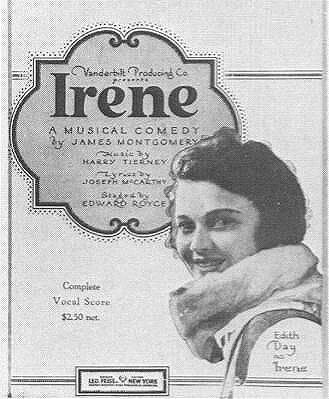
Irene (musical)
Irene is a musical with a book by James Montgomery, lyrics by Joseph McCarthy, and music by Harry Tierney. Based on Montgomery's play Irene O'Dare, it is set in New York City's Upper West Side and focuses on immigrant shop assistant Irene O'Dare, who is introduced to Long Island's high society when she is hired to tune a piano for a society gentleman.
Irene
James Montgomery (play Irene O'Dare)
The musical opened on Broadway in 1919 and ran for 675 performances, at the time the record for the longest-running musical in Broadway history, which it maintained for nearly two decades. It starred Edith Day in the title role, who repeated the role in the London production. It was revived on Broadway in 1923, filmed twice, and had a major Broadway revival in 1973, starring Debbie Reynolds, that ran for 594 performances, followed by a 1976 London run that lasted 974 performances.
Later productions[edit]
In 1971, the revival of the 1925 musical No, No, Nanette with film star Ruby Keeler proved to be a hit. Its producer, Harry Rigby, deciding to cash in on the nostalgia craze by reviving another vintage show with another glamorous movie star as its centerpiece, zeroed in on Irene, engaging Debbie Reynolds to make her Broadway debut in the title role. Rigby hired librettist Hugh Wheeler to rework the show, which retained only five of the original songs and added tunes written by McCarthy with other composers and original numbers by Charles Gaynor and Otis Clements, with additional material written by Wally Harper and Jack Lloyd for the revival. Actor John Gielgud was hired to direct.
The production was troubled from the beginning. Billy De Wolfe withdrew due to illness and was replaced by George S. Irving as Madame Lucy. Reviews in Toronto were mixed, and when Reynolds was stricken with a throat ailment, the producers, rather than cancel the sell-out performances, had her mime her dialogue and songs on stage to Gielgud's reading of them from the wings, much to the dismay of angry audiences. Philadelphia critics were brutal, and Gielgud, an odd choice for a lightweight musical comedy, was replaced by Gower Champion, who had helmed a Los Angeles revival of Annie Get Your Gun with Reynolds. Peter Gennaro was hired to restage the musical numbers, and Joseph Stein was brought in to doctor the book, which now had Irene posing as a countess in cahoots with couturier Madame Lucy (the former Liam O'Dougherty) in a scheme to promote his fashions. Postponing the Broadway opening, the producers brought the work-in-progress to Washington, D.C., where it was seen by President Nixon and his family. Their declaration that Irene was a hit made headlines and spurred advance-ticket sales in New York City.[1]
After 13 previews, the revival opened on March 13, 1973 as the inaugural production of the Minskoff Theatre, where it set new box-office records.[1] It ran for 594 performances. In addition to Reynolds and Irving (who won the Tony Award for his performance), the cast included Patsy Kelly, Monte Markham as Donald, Ruth Warrick, Janie Sell, Meg Bussert, and Reynolds' daughter Carrie Fisher. Raoul Pène Du Bois designed the sets and costumes, with the exception of Reynolds' costumes, which were by Irene Sharaff. The Broadway reviews were mixed, but Clive Barnes of The New York Times described it as "raucous, frequently cheerful, and the best 1919 musical in town."[2] Reynolds and Kelly were each nominated for a Tony Award; Reynolds for Best Performance by a Leading Actress in a Musical and Kelly for Best Performance by a Featured Actress in a Musical. Reynolds' former MGM co-star, Jane Powell, replaced her in February 1974. New York Times reviewer Mel Gussow wrote that "even though Miss Reynolds is gone, Irene survives. The two stars are an equal match for peppiness. Miss Reynolds may score a point for clowning, but Miss Powell wins two for softness."[3] "I'm Always Chasing Rainbows", which had been cut during the pre-Broadway try-outs (although Reynolds' rendition was included in the cast album), was restored to the score. Reynolds returned to play the final week before the revival closed on September 8, 1974, and then took the show on a national tour, playing for five months and setting new box-office records before being replaced again by Powell.[1]
The success of this revival led to a 1973 Australian production with Julie Anthony, who then went on to star in a 1976 London revival at the Adelphi Theatre, directed by Freddie Carpenter and choreographed by Norman Maen, that lasted 974 performances. The cast also included Jon Pertwee and Eric Flynn.[4][5] Additional changes were made in the song list.[6]
Adaptations[edit]
Irene was adapted for a 1926 silent film starring Colleen Moore,[7] a June 1936 Lux Radio Theatre production with Jeanette MacDonald and Regis Toomey,[8] and a 1940 film remake starring Anna Neagle and Ray Milland.